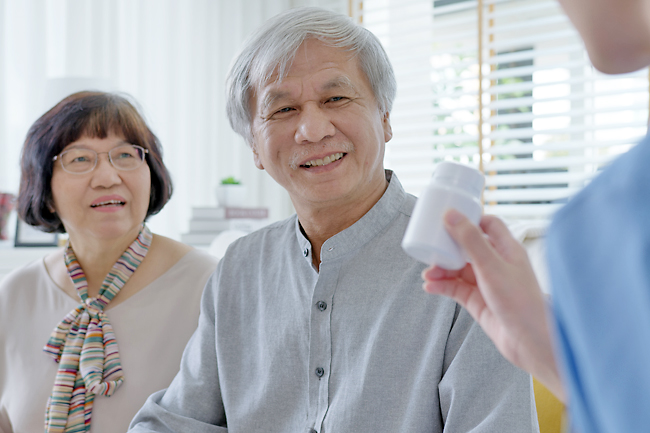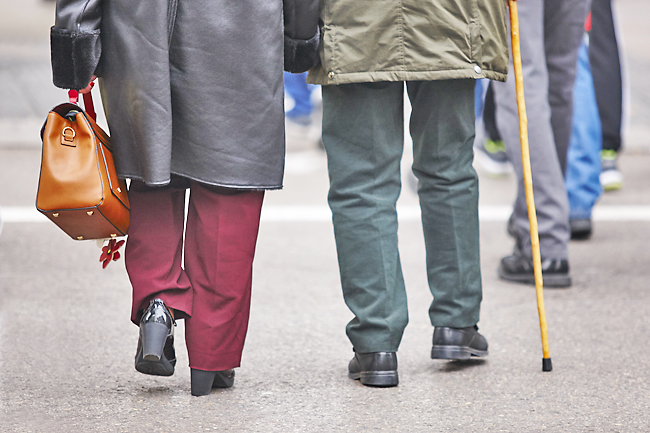Lyna Mohamad
When the first wave of COVID-19 hit the country, many underprivileged families lost their source of income due to restrictions imposed to tackle the spread of the deadly virus or lost jobs when businesses closed down or were forced to make cuts.
As part of welfare reforms and providing assistance to the underprivileged and badly affected families, His Majesty Sultan Haji Hassanal Bolkiah Mu’izzaddin Waddaulah ibni Al-Marhum Sultan Haji Omar ‘Ali Saifuddien Sa’adul Khairi Waddien, Sultan and Yang Di-Pertuan of Brunei Darussalam consented to the new digitalised National Welfare System (SKN) on July 2020 with the reforms aimed to lift welfare recipients out of poverty and ensure that assistance is given to those who need financial support.
There has always been efforts by authorities to help the underprivileged in the country, with the monarch’s goal of ‘zero poverty’ in mind.
PENSION AND WELFARE REFORMS
Last year, His Majesty announced in his titah the amendments to old age pension regulations as well as a new act that aimed to ensure protection to the differently-abled.
The Old Age Pension and Disability Act (Amendment) Order 2021 and the Persons with Disabilities Order 2021 took effect from October 1 where the Ministry of Culture, Youth and Sports (MCYS) as the authority handling it said the new law and amendments look to ensure that persons with different abilities are given equal opportunities and are able to enjoy life “with inclusivity” in the country.
To ensure the welfare of those with different abilities in the country is always guaranteed, several provisions in the Old Age and Disability Pensions Act (Chapter 18) have been amended to strengthen the care of people with different abilities, while also ensuring that financial aid is given to the needy and no one is left behind.


Under the Old Age Pensions and Disability Allowances Act, this privilege is only given to citizens of the country or permanent residents with no national status of any other country, with the condition that they are physically present or residing in the country for the periods stipulated in the act.
“This is an improvement to the Act, as there was no previously stated requirement of citizenship for recipients of old age pensions or disability allowances and only stated period of residing in Brunei Darussalam,” said the ministry.
With this amendment, it emphasises that the receipt of old age pensions and disability allowances will only be for citizens and permanent residents who fulfil the conditions.
The Care Provider Allowance replaces the previous “Dependent Allowances” which were provided for dependants of recipients for blind pensions, mental disorder allowances and Hansen’s disease allowances with allowance of BND250 per month offered under the guidance of the Community Development Department (JAPEM) and replaces the previous allowances of BND113 (under 15 years) or BND188 (above 15 years).
The MCYS stated that the amendment is intended to improve the well-being of persons with different abilities, because it associates giving an allowance as an incentive and to support members of the family to care for the differently-abled, instead of being dependent on such family members for financial support.
The benefit is also extended to recipients of the Disability Pensions, as well as Disability Allowances who were previously not entitled to apply for dependents’ allowance, where a stated care providers is meant as a person who provides care and support to recipients of disability allowances, aged at least 16 and considered as fit by the controller of pensions.
These guidelines are also meant to assess the needs of persons with different abilities to obtain a full-time care provider, if they are bedridden or unable to care for themselves independently, and will be determined based on monthly household income below the
specified threshold.
Under the guidelines, a care provider is required to make a declaration that they accept responsibility for providing care, in which legal action will be taken if the care provider is found to have neglected such responsibility.
TOWARDS ZERO POVERTY
As a ministry that has experience and knowledge specifically in dealing with issues of poverty and had long established coordination with other governmental agencies in handling the issues as a whole, the MCYS has also implemented profiling programmes for its welfare recipients.
These programmes are aimed at identifying the demographic of the recipients in detail so that suitable programmes can be channelled according to their respective situations and ensure the validity of the recipients’ information.
The Special Committee on Poverty Issues uses the profiles to ensure that the group will be given due attention according to their backgrounds and needs. The Special Committee on Poverty Issues under the National Council on Social Welfare has also increased its efforts to implement the Poverty Action Plan aimed at overcoming and assisting the less fortunate to get out of the circle of poverty.
The Poverty Action Plan assists the less fortunate and underprivileged while also focussing on empowering high risk groups.
The tackling of poverty issues includes the cases of youths who are not academically inclined, senior citizens, special needs individuals and handicapped individuals, individuals with low qualifications, heads of big families and single mothers.
The JAPEM Plan of Action on Poverty Eradication covers education, health, employment, capacity building, housing, transportation, entrepreneurship, strengthening mechanisms, financial assistance as well as policy and legislation.
The Welfare Helpline 141 launched by JAPEM serves as a medium for the public to lodge complaints, make enquiries and submit applications, with the 24-hour hotline carries the slogan Kami Mendangar, Kami Memeduli (We Listen, We Care).
It is also a platform to inquire on welfare and community issues regarding the SKN; people with different abilities (OKU) services; monthly welfare assistance; food ration assistance; natural disaster assistance; issues concerning family, women, children and senior citizens; pensions; and allowances as well as a platform to ensure complaints are being managed through proper channels.
Playing a role as an official platform, the Welfare Helpline 141 recorded that more than 50 per cent of the calls received were inquiries on the application procedure for SKN. Amid the COVID-19 pandemic, the Welfare Helpline 141 also serves as a channel for the public to apply for food ration assistance, accounting for almost 17 per cent of calls where in August last year it received 1,627 calls with the total calls were split into three categories – 79 calls related to complaints; 1,547 calls were enquiries; and one call was a follow-up.
Meanwhile, JAPEM’s Child Helpline 121 initiative, also known as Talian ANAK 121 (Anak Negara Aset Kitani) with the motto Kami Mendengar (We Listen), is in line with the strategy and commitment to improve the quality and efficiency of social services for children in the country and as of November, the helpline has received a total of 249 calls, of which 99 involve children’s welfare.
ZAKAT TO HELP THE POOR
The Ministry of Religious Affairs through its Brunei Islamic Religious Council (MUIB) coordinates the management and administration of zakat while the Zakat Collection and Distribution Division (BAKAZ) has been appointed and entrusted by MUIB to handle matters related to zakat affairs, which is responsible in the management of all matters related to more effective collection and distribution of zakat.
With the authority of MUIB, BAKAZ also holds the responsibility of determining the recipients’ eligibility for the zakat money, as well as assistance according to their needs and backgrounds, so that these can be applied accordingly.
MUIB also presented donations during the fasting month of Ramadhan to poor families to help reduce the hardship faced by the poor and assist them in the preparation for one of the most meaningful celebrations in the Islamic calendar – Hari Raya Aidilfitri.





